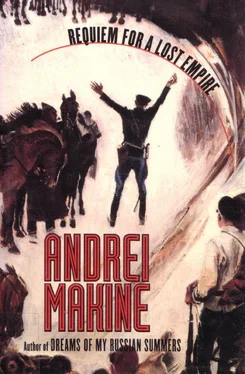The voice booming out on the other side of the wall, which exasperated me so much to begin with, was on the point of lulling me into amused indifference when suddenly I got to the heart of its secret. It was from poets like this that wars derived their effectiveness and staying power. This pure passion, this believer's enthusiasm, was essential: no geopolitical strategies were a substitute for it.
The military lectures that I listened to, bent over the bodies of patients undergoing operations, drove me to reflect, in a way that was simultaneously very direct and somewhat oblique, on the stunning poverty of my experiences with the women I had met and believed I was in love with. Mentally I made facetious comparisons between the technical ingenuity of the weapons whose praises were sung by the instructor (all those self-sealing fuel tanks and decoy-projectors) and the rudimentary mechanics of my own love affairs. I was not yet thirty at the time and my cynicism sometimes had a thin skin. "I've had what I chose to take from those women," I told myself, though not believing it. "What they wanted to give me… All we could have expected from affairs like that…" As I worked away at my phrase-making, I was striving to compete with the perfection of those machines, at least through my combinations of words.
"Curiosity!" All at once the word, long sensed subconsciously, suddenly rang harshly true. The woman who had returned to Moscow three days earlier had been curious about me. And this curiosity had led us into an intense affair in which we played our parts to perfection from start to finish, without any risk of love. Like a deep-sea diver she sounded me out with her body, explored the man who had intrigued her, storing up memories, like those of an exotic country seen for the first time. On the last night before her departure she had not come to me, she had "too many suitcases to pack." I had a sneaking suspicion that already I missed her. But with no great effort of cynicism I contrived to reduce this sense of loss to one for the tactile softness of her breasts, the angle of her parted knees, the rhythmic breathing of her pleasure.
"What the instructor would call technical features," I now thought, recalling that the women who had preceded her (one had worked at the embassy, the other I'd met in Moscow…) had also had the same curiosity, like women explorers. The very distant memory returned that had pursued me since childhood: the birthday party with a family who are generous enough to invite a young, shaven-headed barbarian to join them, two little girls studying me with curiosity, taking minute soundings. Their parents have doubtless warned them that this would not be a child like the others, one without a family, without a home of his own, and who has very likely never tasted jam. Sometimes all these "withouts" seem to the two fair-haired sisters like inconceivable privations, sometimes like a vague promise of freedom. They observe me with the feigned nonchalance of a zoologist walking around an animal with his head in the air, so as not to frighten it, while scrutinizing its every movement out of the corner of his eye.
I translated the curiosity of those little girls into the language of women. I was still the same strange beast who did not behave like the others, that is to say did not save up the pay he earned in all those countries at war, did not aspire to a career, had no plans. For women this life "without" held the promise, now clear, of an affair without the burden of love, of a swift zoological exploration that would have no sequel in their main lives. With somewhat acid irony I told myself that, when it came down to it, I was very like that instructor bellowing away on the other side of the wall ("Four smoke grenade projectors are placed at the front of the vehicle, here and here…") who, apart from the uniform that was never creased, had nothing in his one and only suitcase other than an old suit and a pair of shoes from another era.
It may well have been her youth or her lack of experience (she was just twenty-two and found herself abroad for the first time) that had led me to emerge from my zoological carapace. An interpreter at the embassy in Aden, she had a touch of sunstroke one day, they brought her to us at the hospital. I felt I could be of service, I already knew the Yemen well and, moreover, her vulnerability gave me a pleasant sense of being old and protective. It was an impression that felt like affection. And in making love her body still had the same resigned and touching frailty as on the day of her sunstroke. I came to hope that this attachment might continue, even though at the start of the civil war the embassy was leaving. "We'll meet again in Moscow," I told myself. "It's really time I settled down." It was the first occasion in my life that such thoughts had occurred to me.
She left on one of the first planes to evacuate the embassy personnel and volunteer workers. What shocked me most was not her refusal to meet me again in Moscow but rather the sudden discovery that I dreaded such a refusal, a dread several days old.
"It would be diplomatically delicate," she pronounced, smiling, but with an air of firmness that already transported her into a future where I did not exist.
"Delicate as regards your fiance?" I asked, in a poor imitation of her irony.
"It's more complicated than that."
She intercepted my retort ("What could be more complicated than a fiancé?") by asking me to help her down with her suitcases. At the bus I saw her as she would be on arrival: a suit (the days in Moscow would still be cool), dress shoes in place of her sandals, the air of a young woman who has worked abroad, with all that this implied in a country it was difficult to leave in those days. I racked my brains for a polite but wounding remark that might, if only for a second, have rendered her weak, childish, surprised once more-the way I had loved her and dreaded losing her. Sitting by the window she was already eyeing me in a quite detached way, observing my shoes, gray with dust. "A man I made love with," she must have said to herself, and no doubt she experienced the moment of pity that grips us at the sight of a part of ourselves preserved in the body of someone who will henceforth be a stranger to us.
"I'll write you…"
"But…"
We spoke that "but" in unison, she, straightening up in her seat, I, dodging the dust thrown up by the bus as it moved off. In the place where she was going I had only this vague address of a room in a communal apartment long ago rented to someone else. Here the crackling of gunfire on the outskirts of the city was already audible.
I returned to the hospital on foot. Around the embassies people were gathering, the cars were all heading off in the same direction, toward the airport. It was amusing to see that, in spite of this turmoil, each nation remained true to itself. The Americans were blocking the road with the multiplicity of their means of transport and the ponderous, blithe arrogance of their preparations. The English were leaving the place as if this were merely a routine move, the banality of which did not merit a single extra word or gesture. The French were organizing chaos, giving one another orders, all waiting for the one person without whom departure was impossible, but who had already left. The representatives of the small countries sought the understanding of the big ones.
I did not succeed in gaining entry to the hospital. The soldiers were creating defensive positions around the building, sealing the main entrance, it was hard to know exactly why, and directing their mortar barrels skyward. I was to hear their noise on my own return journey. During the night, spent at the embassy, I tried to identify by ear which district of the city was the worst hit, picturing the empty wards at the hospital, my suitcase in a room on the first floor and, in a drawer, a seashell from the Red Sea, planned as a gift for the woman who had just left. Cynicism not being an attitude that flourishes at night, I failed to see the ridiculous side either of this shell (which ended up the next day beneath the rubble of the bombarded hospital) or of our leave-taking by the bus. And when I finally ventured to revive this mirthless mockery, I would see that nothing else was left in my life, just this exhausted irony and the shreds of useless memories.
Читать дальше










